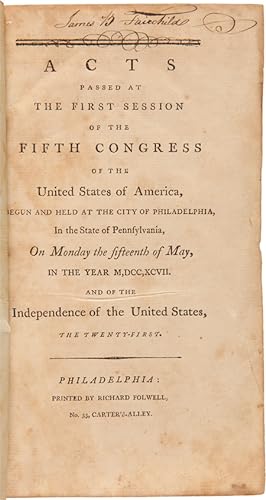About this Item
50,[3],[52]-240,vii,[4],[244]-561,[4],[4]- 26,iv,[48]pp. Contemporary calf, blind ruled, neatly rebacked in matching style. Contemporary ownership inscriptions on front free endpaper and titlepage. Light foxing. Very good. The scarce official printing of the collected laws passed by the Fifth United States Congress, which include the notorious Alien and Sedition Acts, passed in 1798. "There are three Alien acts, which grew directly out of the XYZ Affair and the failure of the embassy to France. Debate began in April 1798, as the story was reported to Congress. The first bill, the Naturalization Act, was signed into law on June 18, 1798. It increased the residency requirement for American citizenship from five to fourteen years and created other hurdles to citizenship (the majority of emigrants were supporters of the Jeffersonian Republicans). The second, the Alien Friends Act, was passed on June 25. It allowed the President to imprison or deport aliens considered 'dangerous to the peace and safety of the United States.' On July 6 the Alien Enemies Act passed, authorizing the President to imprison or deport any male, whether an alien or American citizen, related to an enemy nation in times of war. The first two acts expired in March 1801, at the end of the Adams presidency, but the Alien Enemies Act is still in effect, and was the basis for the confinement of Japanese and German ethnic groups during World War II. Its use has been raised as a possibility in modern times. "Far more important to domestic politics of the era was the Sedition Act, passed on July 14, 1798. This made it a crime if 'any person shall write, print, utter, or publish, or shall cause or procure to be written, printed, uttered, or published.any false, scandalous and malicious writing or writings against the government of the United States, or either house of Congress of the United States, or the President of the United States.to bring them, or either of them, into contempt or disrepute.' A number of individuals were prosecuted under the Sedition Act, notably Representative Matthew Lyon, the aggressive Congressman from Vermont; the political writer James Callender; and some ordinary citizens. The majority prosecuted were Republican newspaper editors such as Benjamin Franklin Bache. The Sedition Act provoked an angry reaction from many, and contributed to the Federalist collapse at the polls in the 1800 election. It expired at the end of 1800, and Jefferson pardoned those still imprisoned under it when he took office in March 1801" - Reese. Several printers in different cities took up the publication of the laws of the Fifth Congress. Richard Folwell, one of the printers in Philadelphia, printed the acts of each session as it finished from 1797 to 1799, and then an omnibus edition in 1799, the present work. This edition is quite scarce, and is not in Evans or Bristol. The ESTC locates copies at only three institutions: the Advocates Library in Great Britain, the American Antiquarian Society, and the Library Company of Philadelphia. Further copies are held by the Library of Congress, the U.S. Military Academy, Cincinnati, Case Western, and Brown. ESTC W14661. EVANS 32952, 34688, 36479 (ref). REESE, FEDERAL HUNDRED 70 (ref). Seller Inventory # WRCAM52689
Contact seller
Report this item
![]()

